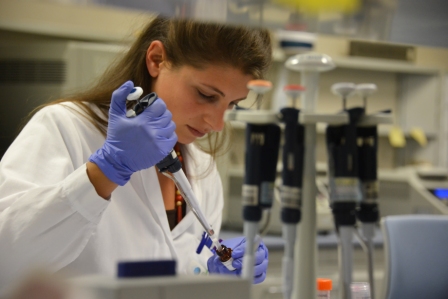 A research coordinated by the Department of Experimental Oncology of the European Institute of Oncology, in collaboration with the International Agency for Research on Cancer, and funded by the Italian Association for Cancer Research (AIRC), adds a new link between HPV (human papilloma virus) virus and cancer. The results have been published on PLOS Pathogens journal, in a paper dedicated to the memory of Prof Umberto Veronesi and Dr Mario Sideri, who strongly supported this study.
A research coordinated by the Department of Experimental Oncology of the European Institute of Oncology, in collaboration with the International Agency for Research on Cancer, and funded by the Italian Association for Cancer Research (AIRC), adds a new link between HPV (human papilloma virus) virus and cancer. The results have been published on PLOS Pathogens journal, in a paper dedicated to the memory of Prof Umberto Veronesi and Dr Mario Sideri, who strongly supported this study.
The authors discovered the cell mechanism responsible for the accrual of the enzyme UBC9, playing a key role in cancer formation. “This mechanism has a strong pathological effect, triggered by HPV virus in pre-cancerous tissue of uterus and head and neck”.
HPV is responsible for over 600.000 new cancer cases each year in the world. Some tumors develop only on the skin, while others grow in the mucous membranes such as mouth, throat (head and neck) or the genital-urinary tract: for instance, the cervix, the tissue where HPV-elicited tumor is more frequent, but also anus or penis. For this reason, is crucial to better understand the link between HPV and carcinogenesis.
“In normal keratinocytes (main cells of the skin) –explains Dr Chiocca, director of the Viral Control and Cellular Pathways Unit of the DEO, and last author of the study – UBC9 is degraded and thus inactivated by authophagy, a physiological process enabling cells to eliminate damaged cells components”.
“Oncogenes of HPV virus can block autophagy –continues Dr Mattoscio, first author of the paper –thus causing accrual of UBC9, which accelerates transformation of healthy tissue into cancer”.
The group led by Susanna Chiocca previously discovered that UBC9 is a relevant target for the virus. As a consequence, researchers hypothesized that if the virus attacks this enzyme, it means that it must have a crucial role for the cell physiology. Further analyzing this mechanism, they discovered that UBC9 is highly expressed in HPV-elicited tumors, and decided to unravel the reason. “Our results –concludes Dr Chiocca- clearly relate the autophagy defect with the virus presence, indicating that both autophagy itself and UBC9 can represent novel therapeutic targets against progression of HPV related cancer. Finally, we are evaluating the possibility of using both (autophagy and UBC9) as tumor markers”.